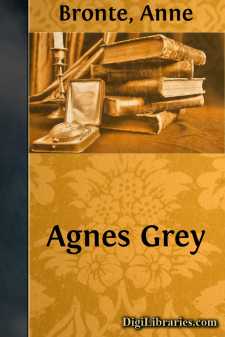Categories
- Antiques & Collectibles 13
- Architecture 36
- Art 48
- Bibles 22
- Biography & Autobiography 813
- Body, Mind & Spirit 142
- Business & Economics 28
- Children's Books 13
- Children's Fiction 10
- Computers 4
- Cooking 94
- Crafts & Hobbies 4
- Drama 346
- Education 46
- Family & Relationships 57
- Fiction 11828
- Games 19
- Gardening 17
- Health & Fitness 34
- History 1377
- House & Home 1
- Humor 147
- Juvenile Fiction 1873
- Juvenile Nonfiction 202
- Language Arts & Disciplines 88
- Law 16
- Literary Collections 686
- Literary Criticism 179
- Mathematics 13
- Medical 41
- Music 40
- Nature 179
- Non-Classifiable 1768
- Performing Arts 7
- Periodicals 1453
- Philosophy 64
- Photography 2
- Poetry 896
- Political Science 203
- Psychology 42
- Reference 154
- Religion 513
- Science 126
- Self-Help 84
- Social Science 81
- Sports & Recreation 34
- Study Aids 3
- Technology & Engineering 59
- Transportation 23
- Travel 463
- True Crime 29
The Tenant of Wildfell Hall
by: Anne Bronte
Description:
Excerpt
INTRODUCTION
Anne Brontë serves a twofold purpose in the study of what the Brontës wrote and were. In the first place, her gentle and delicate presence, her sad, short story, her hard life and early death, enter deeply into the poetry and tragedy that have always been entwined with the memory of the Brontës, as women and as writers; in the second, the books and poems that she wrote serve as matter of comparison by which to test the greatness of her two sisters. She is the measure of their genius—like them, yet not with them.
Many years after Anne’s death her brother-in-law protested against a supposed portrait of her, as giving a totally wrong impression of the ‘dear, gentle Anne Brontë.’ ‘Dear’ and ‘gentle’ indeed she seems to have been through life, the youngest and prettiest of the sisters, with a delicate complexion, a slender neck, and small, pleasant features. Notwithstanding, she possessed in full the Brontë seriousness, the Brontë strength of will. When her father asked her at four years old what a little child like her wanted most, the tiny creature replied—if it were not a Brontë it would be incredible!—‘Age and experience.’ When the three children started their ‘Island Plays’ together in 1827, Anne, who was then eight, chose Guernsey for her imaginary island, and peopled it with ‘Michael Sadler, Lord Bentinck, and Sir Henry Halford.’ She and Emily were constant companions, and there is evidence that they shared a common world of fancy from very early days to mature womanhood. ‘The Gondal Chronicles’ seem to have amused them for many years, and to have branched out into innumerable books, written in the ‘tiny writing’ of which Mr. Clement Shorter has given us facsimiles. ‘I am now engaged in writing the fourth volume of Solala Vernon’s Life,’ says Anne at twenty-one. And four years later Emily says, ‘The Gondals still flourish bright as ever. I am at present writing a work on the First War. Anne has been writing some articles on this and a book by Henry Sophona. We intend sticking firm by the rascals as long as they delight us, which I am glad to say they do at present.’
That the author of ‘Wildfell Hall’ should ever have delighted in the Gondals, should ever have written the story of Solala Vernon or Henry Sophona, is pleasant to know. Then, for her too, as for her sisters, there was a moment when the power of ‘making out’ could turn loneliness and disappointment into riches and content. For a time at least, and before a hard and degrading experience had broken the spring of her youth, and replaced the disinterested and spontaneous pleasure that is to be got from the life and play of imagination, by a sad sense of duty, and an inexorable consciousness of moral and religious mission, Anne Brontë wrote stories for her own amusement, and loved the ‘rascals’ she created.
But already in 1841, when we first hear of the Gondals and Solala Vernon, the material for quite other books was in poor Anne’s mind. She was then teaching in the family at Thorpe Green, where Branwell joined her as tutor in 1843, and where, owing to events that are still a mystery, she seems to have passed through an ordeal that left her shattered in health and nerve, with nothing gained but those melancholy and repulsive memories that she was afterwards to embody in ‘Wildfell Hall.’ She seems, indeed, to have been partly the victim of Branwell’s morbid imagination, the imagination of an opium-eater and a drunkard. That he was neither the conqueror nor the villain that he made his sisters believe, all the evidence that has been gathered since Mrs. Gaskell wrote goes to show. But poor Anne believed his account of himself, and no doubt saw enough evidence of vicious character in Branwell’s daily life to make the worst enormities credible. She seems to have passed the last months of her stay at Thorpe Green under a cloud of dread and miserable suspicion, and was thankful to escape from her situation in the summer of 1845. At the same moment Branwell was summarily dismissed from his tutorship, his employer, Mr. Robinson, writing a stern letter of complaint to Bramwell’s father, concerned no doubt with the young man’s disorderly and intemperate habits. Mrs....




